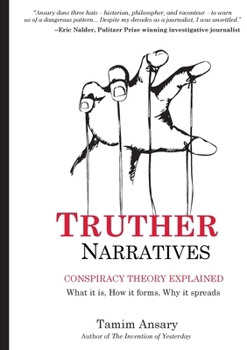Truther Narratives: Conspiracy Theory Explained. What it is. How it forms. Why it spreads.
This book is an extended essay on conspiracy theory. It looks at conspiracy theory as a special case of a larger issue: the way that narrative shapes social reality and indeed our experience of reality. It begins by asking what we mean by conspiracy theory: how does this type of story differ from narratives about real conspiracies, which do at times occur. The search for answers takes the inquiry into psychology, evolutionary biology, social sciences, cultural analysis, and history. Conspiracy theory emerges as a certain type of story: a literary critic would recognize it as a story structure animated by an archetypal myth that all conspiracy theories tend to evoke in common, whatever their surface differences. To this archetypal template, the book assigns a term: the Truther Narrative. It goes on to spotlight instances in history when this narrative burgeoned and fed movements and explores these examples for ideas about how to deal with the surge of the Truther Narrative phenomenon in our own time.





